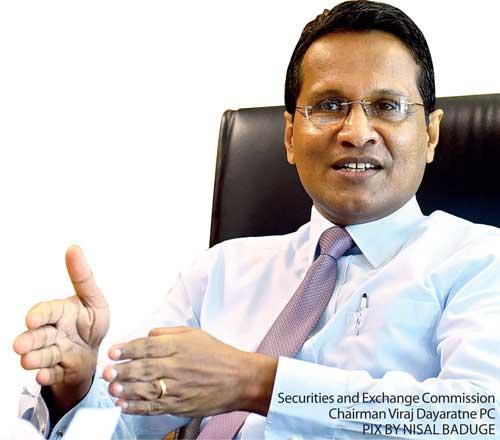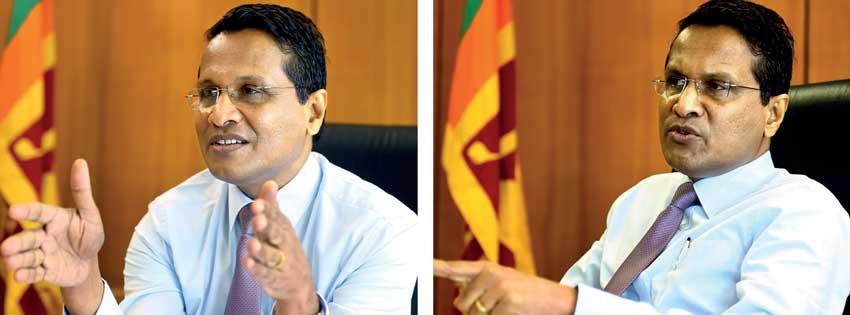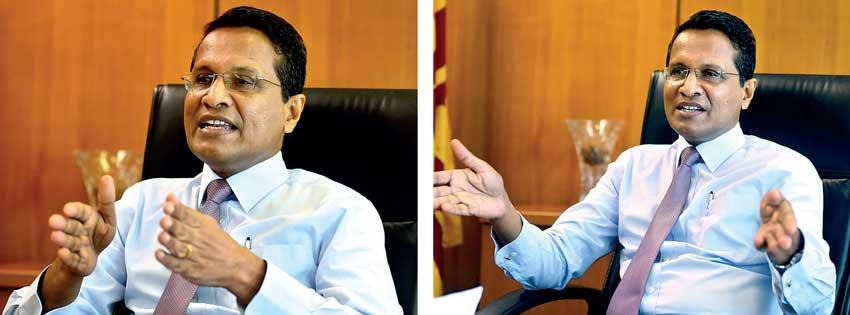22 May 2020 - {{hitsCtrl.values.hits}}
In his first interview with the media, the newly appointed Securities and Exchange Commission (SEC) Chairman Viraj Dayaratne PC talks about the unprecedented challenges he and his new Commission Members had to face and the tough decisions they had to make on the country’s already lagging stock market, amid the COVID-19-induced curfews and economic slowdown.
Following are the excerpts from the interview.
You were appointed SEC Chairman in January. How has the experience been so far?
When I took over, I never thought I would have to face these types of obstacles. Instead of thinking the ways to develop the market, unfortunately, we were forced to think about whether the market can be opened or not, under the circumstances. That was something we never expected. It was unprecedented.

The 51-day market closure sure was unprecedented and it also has become a bone of contention, with some parties trying to point finger at the SEC. Can you explain the thought process behind it?
I think we should look at the context first. It was something totally unprecedented and it was no just one single event that precipitated the closure. As you know, unprecedented times require unprecedented measures. If you look at the government, they were compelled to impose a countrywide curfew to safeguard the health of the people.
The primary concern there was to look after the well-being of the people and the economy came secondary. That is why I think a curfew was imposed as opposed to a lockdown. So, in that context, how could you keep the market open, when the country was going through a strict curfew? That was the ultimate decision that had to be taken.
You’d recall that prior to the curfew, there were two or three days, which were declared as public holidays. That was the first call we had to make whether the market would be open during that period. They were not bank holidays. So, the first day, the CSE spoke to me and said let’s close the market. It was for the balance two days we had to take a decision.
I told them let’s meet. We invited not only the CSE but also a broader spectrum of stakeholders, including the CSBA and other brokers. First we wanted to obtain their views, whether the market could function during a public holiday. There were views for and against. The CSBA cited difficulties they would encounter, if they were to operate. After obtaining all the views, we deliberated among the Commission Members and we decided, based on their observations, that it was not possible to maintain a fair and orderly market during a public holiday.
Form a regulator’s point of view, our concern was to maintain a fair and orderly market. That is what the Act, the statute, says. But of course, other different market stakeholders have different interests. Then we issued a statement saying that it was not possible to have a fair and orderly market during a public holiday.
Then came the curfew. It was a strict curfew, where the movement of people was restricted on health grounds. We were in constant touch with the CSE, brokers and other key stakeholders. The brokers explained to us the difficulties in operating the market during a curfew.
So, to start, I would like to say that it was not that the market was closed; it was not possible to open the market. That is how I’d like to look at it. We never said the market should be closed. We were constantly exploring the possibilities of opening the market and we had to decide whether it was possible to conduct the affairs of the stock market, when the curfew was on.

What exactly were the reasons that made it impossible to open the market?
We asked the CSE to demonstrate to us of their ability to conduct the affairs of the stock market. It is not only whether the CSE could perform their functions within their office premises but all other functions end to end.
Although online trading facilities are available for investors, hardly anybody uses such on their own. Even though the banks offer Internet banking, not many investors and brokers use such facilities in their day-to-day trading activities. A lot of brick and mortar is still present in Sri Lanka’s stock trading as investors and brokers both use cheques and depend on postal services for contract notes.
Also, we found that you can’t open a CDS account online because of the KYC requirements. So, if you are depriving any particular segment of the existing investors or would be investors, that wouldn’t be a fair market. The brokers were clearly not ready to perform all their functions digitally and the banks were also more or less the same. As you know, we couldn’t have afforded a settlement failure.
But the SEC has a guarantee fund…
Yes, we have a guarantee fund, which is about Rs.900 million. But that is catered to meet a different situation. Under normal circumstances, if there was settlement failure, the SEC could have stepped in and utilised the guarantee fund. But you have to act strictly within the trust deed. So, if we were to use the guarantee fund under these circumstances, we need to do that and as you know such cannot be done overnight.
We were even surprised to find out that sometimes brokers have to go to the residences and offices of certain customers for collections and cheques were used extensively to make payments. What we wanted to ensure was that, if we were to open the market, all core functions of all the stakeholders should be carried out smoothly, digitally, without depriving any investor and not creating any settlement risk.
At the outset, the CSE expressed their readiness to open the market. In their detailed reply to us, they said curfew passes were required for the critical staff, who would operate from the CSE premises, because there had to be a physical presence. Our DG was informed that they required at least 250 curfew passes, including for the brokers and branches, if they were to open the market. Then the solution identified was to classify the CSE as an essential service.
We all along appreciated the importance of having the market open and we knew it was not a good thing for the market to be closed. But what you want to do and what you can do are two different things. You want to have the market open and can you have the market open? That was how we approached the issue.
Apart from the need for curfew passes, other challenges included limited banking hours, delay in cheque clearance, inability to open new accounts due to KYC requirements and the inability to send contract notes due to unavailability of postal services.
As a solution to some of these issues, the CSE identified encouraging clients to make electronic payments. That was a good solution but the solutions need to be viable and practically possible. Then we found out it was necessary to discuss with the banks to smoothen out payment delays. So, it was not a question that we had smoothened out but it was necessary.
So, again, even as far as the banks were concerned, as to whether these could be done, there was no finality. There was hope that it could be done, not that the banks had given an assurance.
Then, we had to look at whether the listed companies were ready. As you know, our market is a disclosure-based market. Since their offices were closed, whether these listed firms can market timely disclosures was a big question mark. If timely disclosures weren’t made, then there could be speculative trading, which is not the best for the market.
So, ultimately, when we had this dialogue, we realised that most of the critical issues could not be addressed. And the market was not ready to function digitally. It is not a question of our not wanting to function. But we could not function. That is something I want stress, which nobody seems to have brought out, I don’t know for what reason.
But the general perception was that the SEC wanted the market closed to stem the foreign outflow…
Yes, it was a concern in the economic sense. But our single concern was whether the market could function.

So, there was no role played by the Finance Ministry behind this market closure?
There was no role played by the Finance Ministry with regards to market closure. I will tell you the role they played. After all the discussions, when we realised that we couldn’t function the market without physical presence. Then I wrote to the Treasury Secretary informing of our discussions with the market stakeholders and indicated that a market closure wouldn’t be the best thing to do, as it affects market sentiment. We did this while appreciating what the government was doing—ensuring the safety of the people.
We brought it to the attention of the Finance Ministry that if the market were to function, they had to declare the CSE as an essential service. We brought it to the attention of the Treasury Secretary so he could discuss it with the authorities and take a decision. The Secretary responded to us explaining the difficulty in declaring the CSE as an essential service, purely on health considerations.
Interestingly, the CSE was hailed as a technologically advanced exchange in the Asian region. Where have things gone wrong?
I’m not trying to blame anybody here because this is not a situation anybody wanted. I know there have been attempts made to digitise the stock market. Certain steps were taken but nobody looked at the end-to-end digitisation.
But don’t you think that by now the CSE should have a CCP or at least DVP. Discussions of setting up a clearing house go back to more than 10 years…
They are in the process of doing it. But nobody is satisfied with the time it has taken. The CSE is in the process of introducing it with the Asian Development Bank support and we are providing technical assistance. Ideally we should have a CCP but forget the CCP, we should at least have, as you correctly said, DVP by now.
I have been told that it will take minimum another year for us to see the establishment of DVP at the CSE. I mean, forget the DVP for a moment, let’s talk about the other core functions. If the brokers are collecting cheques physically in an era we are talking about electronic banking, something is surely not right.
Again I’m not blaming the CSE or the brokers. It is just that whether we liked it or not, we didn’t have the capability to operate the market during the curfew.
But in the new normal, you need to fast-track all these. You surely can’t wait for another five to 10 years to digitise the market.
That is exactly why I appointed a committee comprising of the members of the SEC. I wanted the CSE to nominate its members to the committee, which will look into the measures that should be taken to digitise the market and implement electronic clearing and settlement. We have to do it end-to-end.
The committee is supposed to come up with a master plan. To implement that, we may need to have certain infrastructure changes in place. The brokers will need to have these facilities, so it might require money and effort form their part. One cannot say that I don’t have this facility, therefore I can’t. If you want to trade, then it is up to you to have what is required.
The investors cannot simply say I don’t have Wi-Fi at home or I’m not technologically savvy. That is no excuse. If you want to trade, you better come up to mark or forget it. We are not going to wait for anybody. This will require changes to rules and I’m ready to take the initiative. I will make sure all that is done form our end. There is no problem with that.
Foreign investors were not clearly happy with the market closure, specially with the significant depreciation of the rupee.
Yes, the market closure sent out a bad signal to foreign investors. But I believe they will understand, given the limitations we have to deal with. But we will have to win back their confidence.
But you should look at the performance of the market as well when it reopened. Although there were foreign outflows, it was not as much as we expected. Everybody had an absolute bleak picture of the market. Some were expecting a bloodbath.
But I think we certainly have done better. The indices are gaining after an initial dip and the turnover has been higher than this year’s average. I don’t want to jump the gun but I believe the signs are very encouraging.
Similar to the decision to keep the market closed, the circuit breakers introduced also created some controversy…
Okay, so having decided that the market couldn’t function, the next aspect that we had to look at was what happens when the market opens. We looked at that and as a regulator, we also had to be concerned about how the portfolio values will be affected.
In fact, the CSE had identified the circuit breakers as a solution to stem the decline of portfolio values. So, this is not something that we decided on our own. The circuit breakers were identified as solution by the CSE to avert free fall of the market.
We did our own research and looked at other jurisdictions. It is a global practice and we already have circuit breaker option in our ATS rules. So, that’s the reason why we introduced the three-tier circuit breakers. I believe, with the circuit breakers going into action in the first two days after the market reopen, a possible bloodbath was averted. Imagine if we hadn’t done that, then those who find fault with us would ask why the regulator didn’t do enough to control a free fall. The directive on circuit breakers was issued way before the market reopened. Nobody protested it when it was issued.
Are you planning to take any immediate actions to regain the confidence of foreign investors?
First, let me put the record straight. Nobody decided to close the market. It was not possible to open the market, due to the reasons I earlier explained. Now we are taking quick steps to digitise the market and we can ensure that it happens very soon. I think policy initiatives are also necessary from the government’s side. It will happen with the forming of a stable government.
Also, I intend to speak to the diplomatic community in Colombo, probably invite them for a discussion and impress upon them, that this is a good market to invest and to send the message across.
Finally, can you give us an update with regard to the new SEC Act?
The previous Commissions under the preceding governments had done a lot of work on it. It was even listed in the Order Book of Parliament. But unfortunately, it didn’t proceed from there, due to various reasons.
Now we are a new Commission and therefore, we need to go through the piece of legislature thoroughly. I believe the new government will also need to have a look at it and include any changes they may see fit. The SEC Act is an immediate priority for us and we will be pursuing it with all the resources we have to get it approved as soon as possible.
25 Dec 2024 2 hours ago
25 Dec 2024 2 hours ago
25 Dec 2024 3 hours ago
25 Dec 2024 4 hours ago
25 Dec 2024 5 hours ago